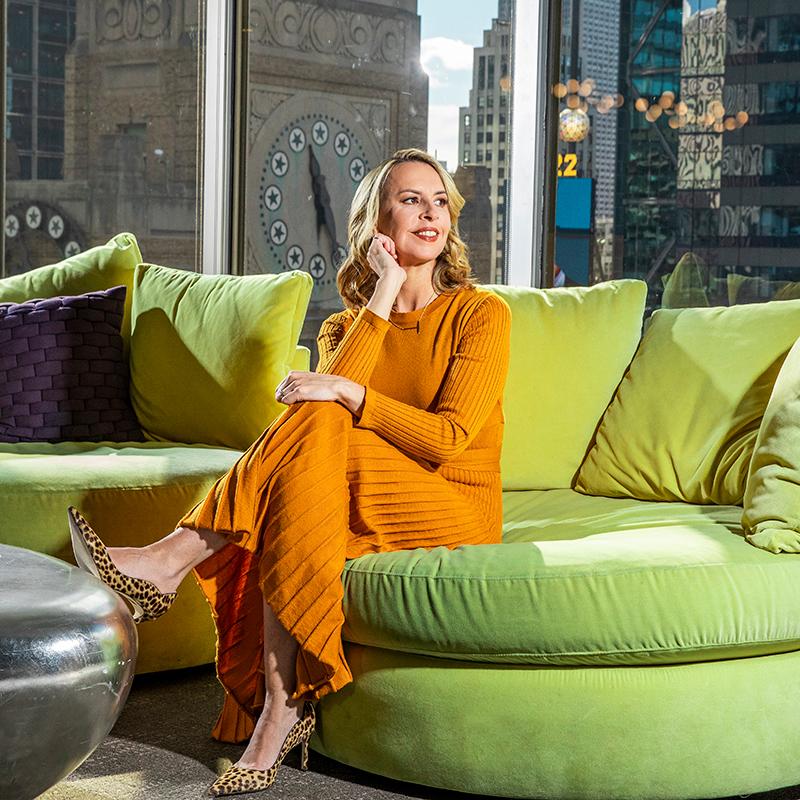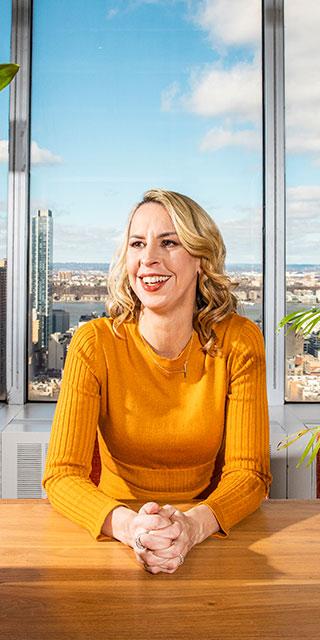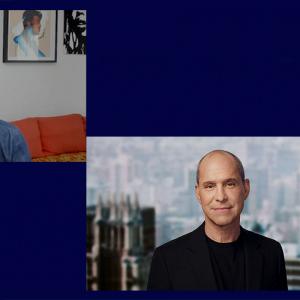MARCH 9, 2022
By Nicole Bitette
Photos by David Williams
The Chief Programming Officer for Streaming on her path to the executive office and the key to curating content for Paramount+ and Pluto TV.
Our In the Office With ... series, gives Paramount executives the opportunity to reveal a little bit about who they are, how they lead, and what drives them in the day-to-day.
Tanya Giles was one of the only adults in the room when a focus group of children saw SpongeBob SquarePants for the first time. Since then, she’s utilized her research prowess and instinctual love of content for more than 20 years.
Giles is the Chief Programming Officer of Streaming for Paramount, overseeing the programming decisions for Paramount+ and Pluto TV. Since starting the role in June 2021, she’s been focused on creating the team that decides what content gets a greenlight and what franchises are reignited or extended.
When it comes to making those content decisions, Giles believes in building a content pipeline that’s both deep and wide. “We know that title diversity really minimizes churn. If you are a household with more than one profile and you watch more than two shows then you’re a high-value subscriber. And that is how our programming strategy is built,” says Giles. “We really think about the whole household and make sure we have something for everyone.”
This interview has been edited and condensed for clarity.
Nicole Bitette: Tell me a little bit about your career background. What was your first professional role?
Tanya Giles: I started at CBS in 1995 in the research department before the first merger and my job was to come in at 7 a.m. and pull the ratings. I took the elevator upstairs to the president's office and delivered the ratings to his desk. I quickly realized that I was the first person at CBS each day to see the ratings from the night before. That was pretty thrilling and intoxicating. I learned that being in research is really where the business moves.
I moved from the analytics side of research at CBS to the other side of research, which was speaking to audiences. That's when I moved over to Nickelodeon because I had a deep passion for kids’ television. My first job at Viacom was in the Nickelodeon research department. I like to say that my claim to fame is that I was the researcher who showed children SpongeBob SquarePants for the first time.
It was thrilling to see children have deep connections to the content and characters and stories. I knew that there was something powerful to that as well. There's the power behind the numbers in the business, and how the fans feel about the content you bring to them is why we do what we do.
In 2002, I went from the kids' side of the business to more of our adult-focused brands. Eventually, I was overseeing research for all of the entertainment brands, which at the time included Comedy Central, TV Land, and Spike (now Paramount Network). Research has always been highly valued in this company and I always had a seat at the table.
NB: How did you transition into more programming-focused roles?
TG: I was involved in many of the big decision-making conversations around content, how we're moving audiences, and how we're growing these brands. I was able to really develop my strategic programming skills, including how the shows and the decisions get made. I met enough people in the company where I built a reputation for my executive sensibilities. So, when there was an opportunity to become a General Manager for Comedy Central, I jumped at it.
Kent Alterman was the president of Comedy Central at the time, and he needed somebody to be his right hand on the business functions—overseeing research, programming, marketing, social, and digital—in the New York office. Once the content was made, it moved its way to our department to determine the best way to deliver it to the fans.
NB: How did that shape what you’re now doing in streaming?
TG: Being in a seat where I was the decision-maker was a big switch. Knowing that the buck stops with me required a whole new muscle. I worked in tandem with programming and marketing, etc., but really understood how those processes work and how those decisions get made on putting together a schedule and what is needed to put together a campaign. That's what I truly understand from soup to nuts and has helped me become a more holistic executive. When it comes to streaming, in order to run the programming business, I have to be the spoke in the wheel for a lot of our internal studios. It’s that central position where I’m setting the programming strategy and the content strategy for streaming.
NB: Can you explain the relationship between Paramount’s linear and streaming content pipeline?
TG: One of the great advantages of Paramount+ is that it’s part of Paramount’s fantastic ecosystem. We can promote shows on linear, but we also have tremendous opportunities to partner with the networks or even the shows themselves to launch new content.
One example, of course, is Yellowstone. We knew Season 4 was coming back. The fan anticipation for the show was at max highs. We waited to launch Yellowstone when we knew we would have two shows that were also coming from the Taylor Sheridan universe for Paramount+, including 1883 and Mayor of Kingstown.
Yellowstone came back with huge numbers in the first week and then in the second week, we aired Mayor of Kingstown right after Yellowstone on linear and premiered it on Paramount+. So, fans of Yellowstone were exposed to it on Paramount Network with the promise that you could immediately go to Paramount+ and watch episode two of the new original series.
We did the same thing with 1883 a few weeks later in November. Then in December, we followed up withYellowstone episode eight, where there was a flashback to the origins of the Dutton family where audiences saw Tim McGraw and Faith Hill, who are characters in 1883. They could immediately see the premiere of 1883. If they went to the service, then the first two episodes were available.
We saw that about 30% of the audience who came to Paramount+ to watch 1883 started with episode two, so we know that that was a huge driver. We've done that in other ways with Seal Team, which was a great show on CBS, and this season we knew it would be a fantastic addition to the Paramount+ lineup. We wanted to have a seamless handoff so the fans understood where to find it. Three episodes premiered on CBS where we promoted that it would be moving over to Paramount+. Then, in episode four, we made the handoff and it was available on Paramount+. The audience followed, which is great to see.
We also have huge opportunities for cross-promotion with the NFL. We premiered the Big Nate trailer during the Wild Card game that was on Nickelodeon and debuted the Halo trailer in the AFC championship game. It’s truly a competitive advantage, in streaming especially, that we have the enormous power of Paramount to create and promote content.
NB: What excites you about the future of Paramount+?
TG: We're going global. Expanding around the world is truly exciting. So many of our franchises have fans around the world, so to be able to extend franchises for those fans is fantastic. And of course, all the exciting content we have in the pipeline from Halo and Star Trek: Picard to The Fairly OddParents: Fairly Odder and the second season of iCarly. We have amazing in-house studios that are producing this content on behalf of the service and we have created a total household platform where SpongeBob can live alongside Beavis and Butthead and Jean-Luc Picard and James Dutton and Halo’s Master Chief.
![]()
One of the great advantages of Paramount+ is that it’s part of Paramount’s fantastic ecosystem.”
NB: How is our free ad-supported service Pluto TV resonating with consumers?
TG: The future is super bright for Pluto TV. Our three-pronged streaming strategy means there's something for every consumer. With Pluto TV, it’s ease of use. If you just want to just drop in, it’s free. It’s a lean-back experience providing consumers with amazing content that our programming team has curated. It’s a fantastic value proposition to consumers.
NB: Zooming out to the streaming ecosystem overall, what makes a service a must-have from a consumer point of view?
TG: We know that title diversity really minimizes churn. If you are a household with more than one profile and you watch more than two shows then you’re a high-value subscriber. And that is how our programming strategy is built. We really think about the whole household and make sure we have something for everyone. We have the most diverse content of any streaming service with breaking news, live sports, and a mountain of entertainment. That’s a must-have to me.
“Creating a platform where SpongeBob can live alongside Beavis and Butthead and Jean-Luc Picard and James Dutton and Halo’s Master Chief is exciting.”
NB: In November, Paramount+ reported its best week ever in terms of viewership. How is your team planning to keep up that momentum?
TG: Well the great news is that we have. December was fantastic. January broke the record as our most-watched month and March, which marks the service’s one-year anniversary, is going to be amazing. Star Trek: Picard season two premiered last week and on March 24th we have the highly anticipated premiere of Halo, which will be followed by the debut of The Fairly OddParents: Fairly Odder on March 31.
Then, in the second quarter, we have the limited series The Offer, which is about the story behind the making of The Godfather movie, which was almost not made. We'll have the Godfather movie collection on the service at the same time for a total fan experience. It's also not just about the story of the Godfather and how that movie was made, but the story of Paramount as a studio at that time. There are so many Easter eggs of movies that are referenced in it and we've acquired many of those titles or brought them over from the Paramount library to feature in the service. So you can watch The Offer and say, “Oh, I forgot about Love Story.” And then go watch Love Story.
NB: You’ve been within the Paramount family for your entire career. What makes you stay?
TG: The people and the relationships are truly special. There's something about this company and our brands that attract very passionate and hardworking people and its alchemy is something that you just don't find in other places.
SMALL TALK
If you weren’t in this field, what would you do for a living?
TG: I used to memorize the TV guides schedules when I was six years old and I was a TV major in college. I have a hard time imagining a different path but would want to be in a field that also helps people laugh, escape, and connect with others.
What's the best advice you've ever received?
TG: Know your brand and grow your brand. Know what your strengths are and what you bring to the table and ALWAYS take a seat at the table. For me, I became known as a true fan of TV. I knew the landscape well and I became a fan of fans and really speaking for them and representing what I know they wanted from our storylines and our characters. That was my brand and it became valuable. The other advice is to always be ready for the next opportunity. To constantly be aware of the business and the landscape and the challenge to constantly be thinking. If you stay ready, you don't have to get ready.
What are you currently obsessed with?
TG: I’m a huge Buffalo Bills fan. My heart was broken during the AFC playoffs. I was obsessed and put all of my energy toward the Buffalo Bills playoff run. I'm also really obsessed with my family and my children. My son is starting his college search and my other son is navigating middle school. Helping them is my focus.
Who is your most recent hire and what qualities do you look for in an employee?
TG: My most recent hire is Michael Chang, who started as EVP of Content Planning and Strategy. He helps us with evaluating our green lights, getting the most of the content we have, and creating a content mix to really be successful and grow. It's a function he built at Hulu, where he was most recently. Where he stood out is his great functional knowledge and his experience, but also he has just a passion for what we're doing. He wants to be with us building it from the ground up. He’s also just a fun and amazing guy and I knew he would love it here.













